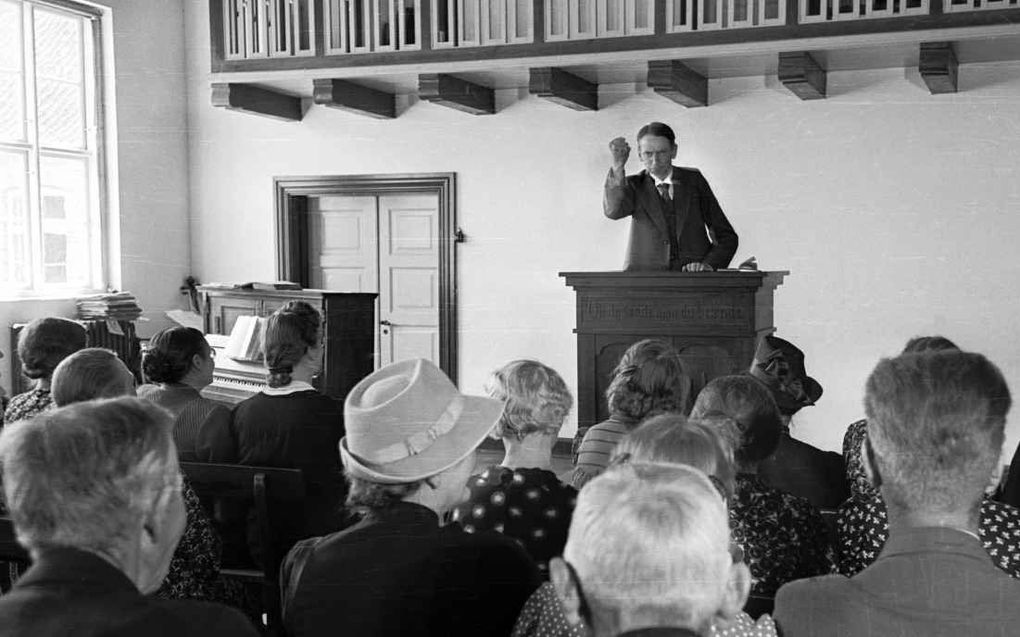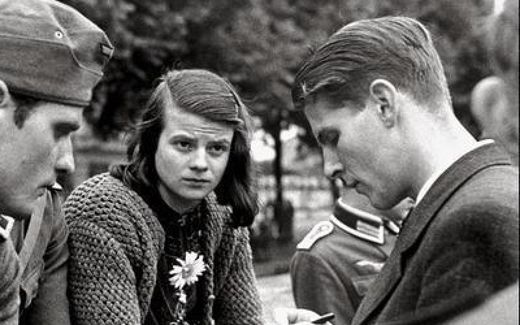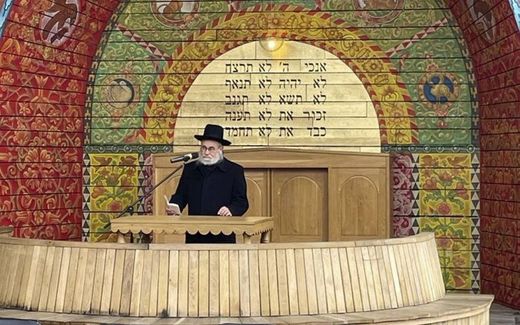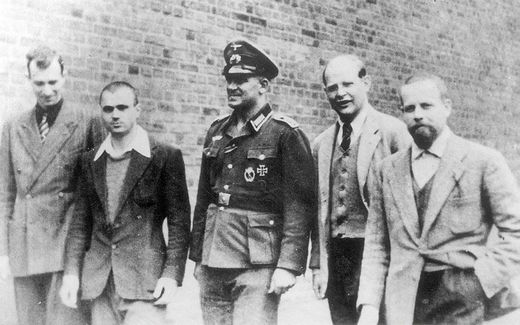Danish resistance hero defied Nazis with fierce protest
16-07-2022
Northern Europe
Klaas van der Zwaag, RD

Kaj Munk during one of his sermons. Photo Vittus Nielsen
Northern Europe
"What is Christianity? Reverence for Christ." That message was written on a small note that the Danish resistance hero always carried with him. The pastor, who was also a playwright and resistance fighter, was killed in the battle against Nazism during the Second World War.
Kaj Munk lived as a local pastor with his wife and five young children in Vedersø, one of the most picturesque towns in Denmark, located close to the sea. He revealed himself as a diverse person: artist, poet, journalist, and playwright. Life looked happy for him. His plays became nationally famous.
Until Germany grossly violated the non-violence treaty with Denmark in 1940. The country surrendered unconditionally, and Munk was furious. And the Church looked the other way. "The church ought not to preach faith, hope and love, but courage", he told his Lutheran colleagues in September 1941. "No, that is not even challenging enough. My lords, brothers in the ministry, our task today is recklessness."
Public resistance
Munk practised what he preached when the Germans deported the head of the Norwegian Church, bishop Berggrav. As a precautionary measure, the Germans distributed a letter in which they admonished people to keep quiet about it. In response, Munk immediately wrote a letter on March 27, 143. In it, he told the occupiers: "I have the honour to announce to you that I think I should disobey this command, but also that I will act contrary to it." "It is better to harm the Danish relation to Germany than in its relation to the Lord Jesus."
Pastors were called to speak according to God's Word and not keep silent. His letter ends: "Here I am, I can do no otherwise. Because man would better not act contrary to his conscience."
Munk also defended the Jews who were dragged to concentration camps: "And we, in Demark, would not dare to act for our country, our faith and our ideas?"
Already in the nineteen thirties, Munk chose the side of public resistance in the form of articles, sermons and politically laden plays. On November 17, 1938, a week after the nationwide pogrom in Germany, the so-called Night of Broken Glass, his open letter to the Italian leader Mussolini appeared in the newspaper Jyllands-Posten. Later, Munk wrote various plays on this topic. Especially his play "He sits at the crucible" (1938) became known. The play is about the useless attempt of a German scientist to change the Jew Jesus into an Aryan.
Escalation
Kaj Munk travelled to Copenhagen in November 1943. He held a speech in the Church of the Holy Spirit against the German occupier. After the persecution of the Jews also reached Denmark, Munk called his audience on December 5, 1943, in a historical sermon – about the wise and foolish virgins – in the Dom church in Copenhagen to protest. The persecution of the Jews "violated the Constitution of the Kingdom of Christ and was contrary to the commandment of compassion, and terrible for the free Danish spirit."
The Church should not let this happen. "If this continues, we will attempt to call the people to resistance." In the end, he turned to the Germans. "You can take away everything from me, but martyrdom you cannot take." The German occupier immediately issued a preaching ban on him, so the afternoon service was cancelled. But Munk preached in the Church of our Lady, the large cathedral of Copenhagen.
In fact, he signed his own death penalty with his action. A month later, it was carried out (see "The eventful life of a Danish writer"). On New Year's Day, he announced in Vedersø that he would step down as pastor. "Nowadays, it is impossible for me", he said, standing in his overcoat with a red scarf, without a robe, "to stand on the pulpit or in front of the altar because people from our congregation, even when they did not have to, have enlisted for German service." He referred to the Danes who helped the Germans to build their defences on the coast.
Impressive were his words: "I am not here to preach hatred. I cannot do so. I do not even hate Adolf Hitler. I know the state of terror the world is in. I know the defamation of my country." These were his last public words. Three days later, he was picked up by the German secret police and randomly shot down on the street.
Theology
In the Memorial Chapel of the Dom Church in Utrecht, Kaj Munk's name is mentioned in the same list as Dietrich Bonhoeffer and Martin Luther King. All three acted fearlessly. Journalist and writer Johan Winkler characterises Munk rightly as a pastor, poet and martyr. Munk saw the evil consequences of the silence of the Church for the life of the people. "A Christian people that looks on its ideals being trampled without doing anything grants the deadly germ of decomposition access to his spirit. That person will be hit by God's wrath."
Munk criticised, just like his Danish predecessor Søren Kierkegaard, half-hearted bourgeois Christianity. "Please leave the church if you think that you can serve God half-heartedly and lukewarmly", he writes in one of his works. In line with Kierkegaard, he states that Christianity is not a doctrine but a way of life. That is why he finds theology in general too theoretical and too abstract. "I have always thought that dogmas are the way in which the devil grows Christianity", he writes in his autobiography.
The "heaven maniac" Christians are busy reserving a place in heaven but renounce the earth, Munk writes. For him, the actual study of the pastor starts when he finishes his study. The average pastor does not lock himself in his room, "being scared that he will meet people with a different opinion than him when he goes out." "It is a terrible phenomenon when the Church becomes some freemasonry for a special group of people. It is a rough phenomenon of degeneration when the Church has to be fertilised by self-pollination."
Munk knew that he signed his own death penalty when he openly defied the command of the German occupier. He called people to reckless behaviour. But was that smart to do? The truth is not something for careful people, Munk said during a sermon in 1942. Those people do not need truth but a lazy couch. "It is a useless requirement for the Church to be careful. Was Christ careful? Were the martyrs careful?"
The eventful life of a Danish writer
Kai Harald Leiniger Petersen, better known as Kaj Munk, was born on January 13, 1898, in the Danish town Maribo. He grew up in a rural family of labourers. His parents passed away when he was a child. Thus, he was brought up by an aunt and uncle in a home stamped by the pietist revival movement Indre Mission (Inner mission).
Munk's love for poetry and literature brought him to write poems and plays. He started to study theology but struggled with choosing between poet and pastor. Thus, he became both: a pastor in the quiet and picturesque Vedersø in Jutland, close to the North Sea coast, and a famous playwright. He was too much of a poet to immerse himself into theology completely. He found it to be too theoretical and abstract.
Munk knew what would happen when he turned against the nazis openly. He writes that he had not gone to sleep for months without saying to himself: "Will they come to get you tonight?" "And that is not a happy thought for someone who loves his life."
After his infamous sermons in Copenhagen and Vedersø, he was arrested in the night of January 4, 1944. The Gestapo arrested him when he was among his family members. Calmly he said goodbye and told his wife: "Stol paa Gud" (Trust God). He was killed on the road. Passers-by found his body the next day on the roadside.
The funeral, which was held in Vedersø, was not announced anywhere. Yet, thousands of people came to the Church. Despite the rain and wind, they waited outside the church building of Vedersø until the service was done. Munk was buried at the foot of the Church. His grave has been there until today. Every year, it is visited by thousands of people. Kaj Munk became a Danish resistance hero. At his funeral in Vedersø, pastor Nøjgaard Nøjgaard preached about Luke 12:49: "I am come to send fire on the earth."
Kaj Munk did not preach without reason about John the Baptist during an Advent sermon in 1943. "John the Baptist was a reckless man. He believed the truth." Why did John not keep silent when he admonished Herod because of his unlawful spouse? "That would have been much smarter and more careful."
At the same time, John the Baptist was a man of flesh and blood. In prison, he doubted his calling, while Herod kept on committing adultery without shame. And was Jesus the real Messiah? Why did Jesus never visit His friend in prison? Munk did not see himself qualified to "criticise Christ", he said ironically. But he does say the following: "Is it not inherent to the truth that she makes man for a time very lonely and maybe must make him very lonely too?"
Related Articles





